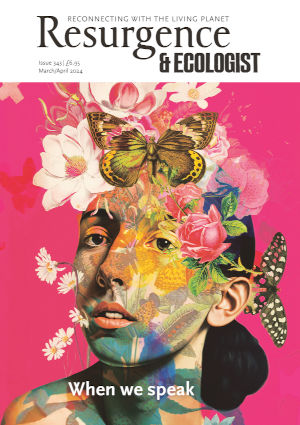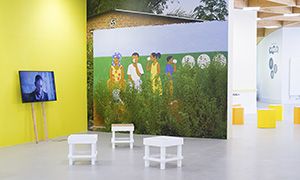Acts of Gathering brings together artworks and ideas that celebrate and interrogate the nature of food culture in a rapidly changing world.
Food has shaped human history, determining the paths we follow and the tools we favour, creating unions and war, and changing landscapes and atmosphere. Food can energise us and treat our illnesses, but it can also be a vessel for our beliefs and cultures – a way of sustaining memory and connection.
Acts of Gathering is part of the Eden Project’s 2023–4 global food security theme and features work by Jonathan Baldock, Serge Attukwei Clottey, Maria Nepomuceno, Uriel Orlow, Nina Royle and Lucy Stein. It demonstrates how different communities across the globe honour a relationship with the Earth through the practices that govern growing, harvesting, preparing, eating and sharing.
Acts of Gathering invites people to consider how the emergence of customs and traditions in relation to food can enhance our connections to each other and to the land. We recognise that we need to feel connected to the land in order to care for, protect and restore it, and that connection to land and customs of care vary across continents and cultures. The exhibition calls into question the politics of food customs and traditions, asking why some are supported and others not.
In the globalised food system, there is less value placed on food’s deeper, intrinsic meaning to community and culture. Instead, economics tends to determine who can access food and in what ways, whilst industrial growing practices are typically guided by efficiency rather than sustainability, creating a disconnection between the production of food and the health of the land. As the food system has become more centralised – with the largest 1% of farms (those greater than 50 hectares) operating 70% of the world’s farmland – access to land has been reduced, particularly for rural women, Indigenous peoples and landless rural communities.
Through these practices, as well as through increasing land inequality, the customary aspects of food growing, gathering, sharing and eating have been marginalised. This has been driven over centuries by processes of colonisation and land enclosure across the globe. As a result, traditional ways of cultivating the land, ancestral foods and generational knowledge have been suppressed.
Embodying community
Acts of Gathering explores the materials, performances, songs and actions that embody community knowledge of the land. It invites people to think about their own connection to food and land and to consider what ritual and community mean to them.
Featuring corn dollies, traditional weaving work, repurposed plastic containers and painted murals, the works express different communities’ interactions with food and celebrate how global and local forces shape these relationships. For example, corn dollies were traditionally made from the last sheaf of corn cut at harvest. The spirit of the corn is thought to inhabit the dolly once the field has been harvested, eventually being returned – in sacrifice – to the earth when the field is ready to be sown again. Historically, different counties in the UK have been associated with varying shapes of dolly, which took hundreds of different forms. In Jonathan Baldock’s work, corn dollies are a reimagined blend of various designs and local vernaculars.
Nina Royle and Lucy Stein’s work ‘Crying the Neck’ also celebrates agrarian ties and rituals, reflecting the duality of celebration and mourning that accompanies harvest and seasonal change. It also explores the relationship between the female body and the traditional act of ‘crying the neck’, which is part of the Guldize festival in Cornwall when the last sheaf of corn is cut and the end of harvest proclaimed.
Serge Attukwei Clottey’s ‘Better Days Are Coming’ is an audio piece that takes its title from the harvest festival Homowo celebrated by the Ga people of Ghana. It begins ahead of the rainy season with the planting of crops – predominantly maize and yam – and remembers the famine that once befell communities in pre-colonial Ghana. Today the consequences of climate change are once again causing poor crop yields, impacting both farmers and the communities they feed.
Originally commissioned by the Lubumbashi Biennale, Democratic Republic of Congo, ‘Learning from Artemisia’ by Uriel Orlow spotlights a medicinal plant traditionally taken as an infusion to prevent and treat malaria. Orlow worked for several months with a women’s cooperative in Lumata, south of Lubumbashi, growing Artemisia afra. This mixed media piece explores how the sustainable cultivation of the plant as a traditional medicine offers a way of caring for the health of people and land, creating pathways to non-extractive relationships with natural resources and community solidarity.
The exhibition reflects on ideas around communal ownership of food and land and how ‘commoning’ – the practice of collaborating and sharing to meet everyday needs – is enacted by different communities, often in a way that is simultaneously threatened and resilient.
As part of the wider programming for Acts of Gathering, Eden worked with CAST (Cornubian Arts & Science Trust) to present Jumana Manna’s feature-length film Foragers, which depicts the dramas around the practice of foraging for wild edible plants in Palestine and Israel. Shot in the Golan Heights, Galilee and Jerusalem, it employs fiction, documentary and archival footage to portray the impact of Israeli Nature protection laws on these traditional customs.
Workshops in response to Maria Nepomuceno’s ‘Você me alimenta’ were also part of the public programming. Participants were invited to make offerings inspired by Nature in clay, enclosed within which were wishes for a better future. These offerings have been added to Nepomuceno’s sculpture throughout the exhibition, as a way of feeding and nourishing it.
Acts of Gathering explores all of these ideas and more, and invites people to think about their own connection to them, offering the space to consider what ritual and community mean in their own lives. It also celebrates the power of the imagination, of ceremony and of action, in reuniting us with each other and with the land.
Acts of Gathering is curated by Misha Curson and Hannah Hooks and is at the Eden Project, Cornwall until 14 April 2024. www.edenproject.com








